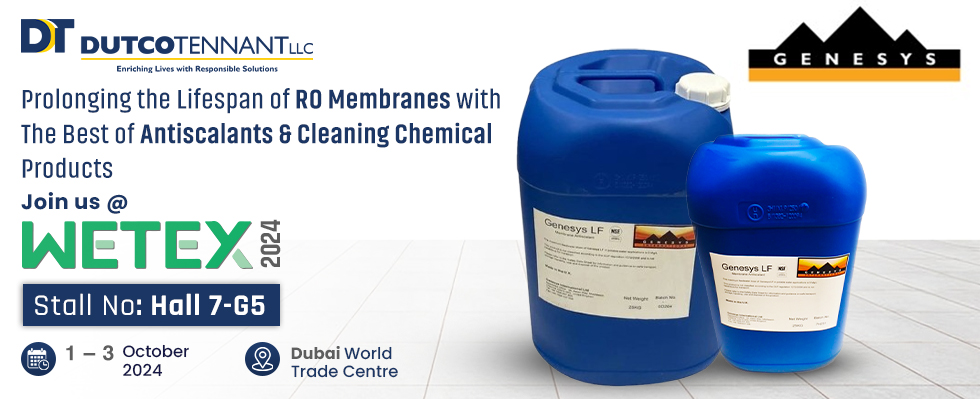
Prolonging RO Membrane Lifespan: The Best of Antiscalants & Cleaning Chemical Products
Reverse Osmosis (RO) membranes are a cornerstone in water treatment systems. They play a crucial role in delivering purified water for industrial, commercial, and residential applications.
However, the buildup of various scales and deposits can significantly shorten the lifespan of these membranes. The depositions are also responsible for reducing efficiency and increasing operational costs.
Prolonging the life of RO membranes involves the strategic use of antiscalants and specialised membrane chemicals for efficient cleaning. We at Dutco Tennant supply a range of high-end formulations of antiscalants by Genesys.
Let’s explore how to tackle the most common scaling challenges faced in RO systems using the best chemical solutions available.
Calcium Carbonate (CaCO₃) Scaling
Appearance & Challenges: Calcium carbonate is the most prevalent form of scale found in RO membranes. They typically appear as an off-white powdery deposit.
This type of scaling can cause a rapid decline in membrane performance. Hence, leading to reduced water flow and increased pressure drop.
Solution: Calcium carbonate scale is relatively easy to clean using strong acid-based products. Genesys LF is the antiscalant that can be used to combat them. Alternatively, cleaners – Genesol 37 and Genesol 38 are ideal for removing calcium carbonate deposits.
These products work effectively to dissolve the scale, restoring membrane efficiency.
Silica Scaling
Appearance & Challenges: Silica can be a persistent issue in RO systems. It manifests as colloidal silica or aluminosilicates on the lead membrane elements, or as scale on the final elements.
Both forms are highly dependent on pH and temperature, making them notoriously difficult to remove.
Solution: For tackling silica scaling, antiscalant products like Genesys SI work amazingly. Experts from Genesys also recommend using cleaners Genesol 40, or Genesol 703 for use.
Calcium Sulphate (Gypsum) Scaling
Appearance & Challenges: Calcium sulphate appears as sharp, blade-like crystals that can physically damage the membrane surface. This form of scaling is common in regions with high natural sulphate content in the water source.
The result is difficulty in cleaning and maintaining membrane integrity.
Solution: The cleaning of calcium sulphate scale requires specialised RO membrane antiscalants and cleaning chemicals. For example, the Genesys CAS is an antiscalant that can be used to remove this type of scaling deposit.
Additionally, cleaners - Genesol 50, 34, and 703 are to be utilised for optimal results.
Calcium Phosphate Scaling
Appearance & Challenges: This type of scaling is frequently observed in RO systems treating wastewater or agricultural leachate due to high phosphate content. Calcium Phosphate scaling can take on various forms, complicating the cleaning process.
Solution: Products such as Genesys PHO, Genesol 37, and 38 are highly effective in removing calcium phosphate deposits. These cleaning agents target the phosphate scale, preventing long-term damage to the membrane.
Magnesium Hydroxide (Brucite) Scaling
Appearance & Challenges: Magnesium hydroxide scales precipitate in membrane systems when the pH exceeds 9.5. It is a relatively rare scaling type. Its presence is usually seen in brackish water plants that increase pH levels to aid in boron rejection.
Solution: Using Genesys MG antiscalant, professionals can eliminate the deposits. Furthermore, Genesol 37 and 38 are cleaners that can effectively tackle magnesium hydroxide scaling.
These chemicals help in maintaining the membrane’s performance by preventing brucite buildup.
Barium Sulphate (Barite) Scaling
Appearance & Challenges: Barium sulphate appears as white crystals that may form sharp structures. Because of such formation, it is extremely challenging to remove the deposits effectively.
Solution: Genesys BS, Genesol 50, and 34 are the go-to solutions for dealing with barium sulphate scale. For effective cleaning, consulting experts for a tailored cleaning protocol is recommended.
Strontium Sulphate (Celestine) Scaling
Appearance & Challenges: Also known as celestine, manifests as needle-like crystals that can damage the membrane surface. It is another difficult-to-remove scale that requires specialised treatment.
Solution: For strontium sulphate deposits, Genesys CAS is a specialised antiscalant. Genesol 50, and 34 are also ideal cleaning products to be used.
Get in-depth insights about these membrane chemicals and connect with the experts firsthand in our showcase at WETEX 2024. Join us to meet our partner Genesys and their innovative formulations for RO membrane cleaning.
